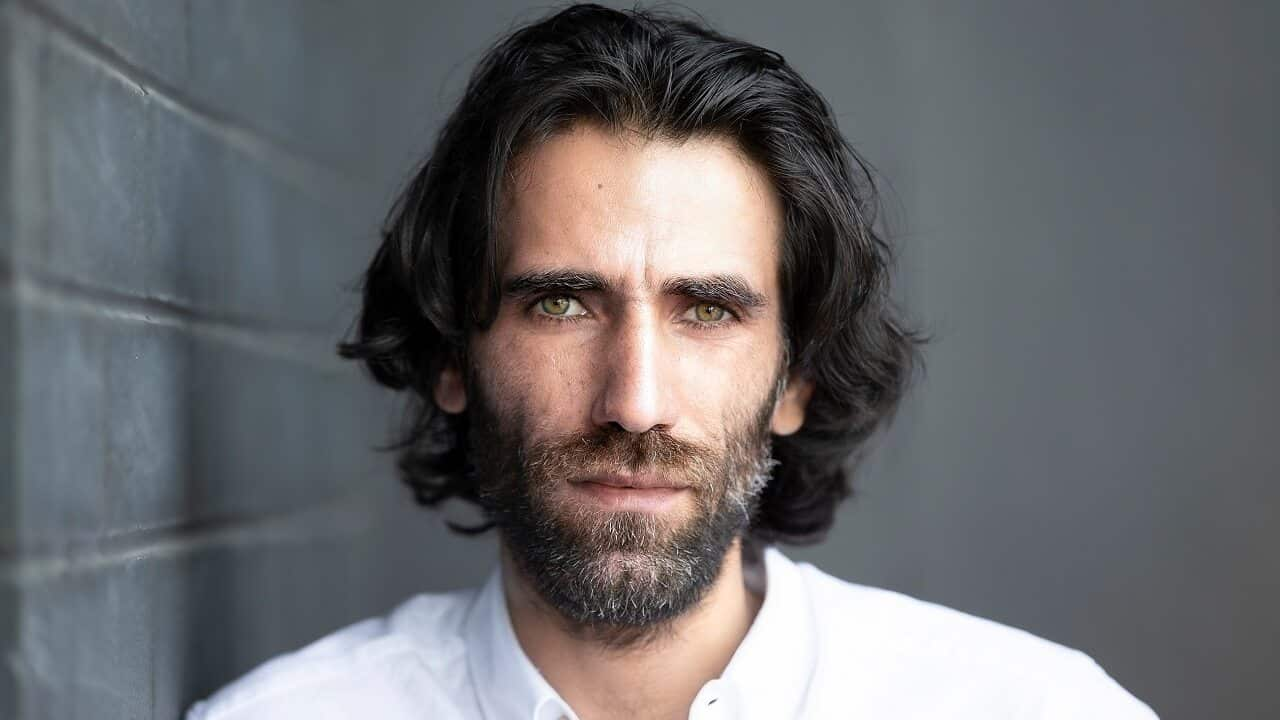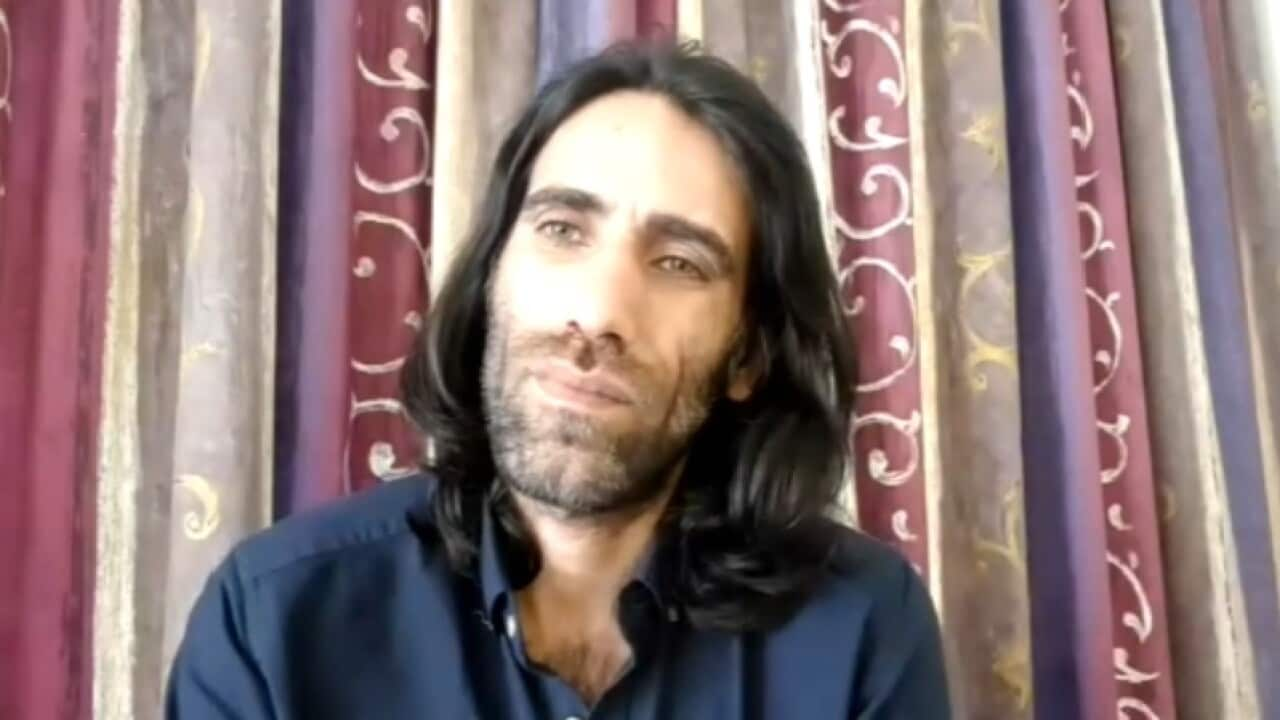Inspired by Kurdish-Iranian journalist Behrouz Boochani's highly acclaimed book, No Friend but the Mountains: A Symphonic Song Cycle will debut on March 21, aligning with Newroz Kurdish New Year celebrations and Harmony Day in Australia.
Developed with composer Luke Styles, it is a project Boochani says has been in the works for more than a year.
As a musician and vocalist, the former Manus detainee who , says music is a “tool and language” for resistance and survival, as well as a way to challenge the system.
“I was waiting for a long time [for] someone to ask me to do some musical work based on the book and my other works," he says.
"I believe that we should record this part of Australian history through different kinds of projects, and I believe artistic language and literary language are very important." The book, released in 2018, is an autobiographical account of Boochani's journey to Christmas Island and his subsequent detention on Manus Island.
The book, released in 2018, is an autobiographical account of Boochani's journey to Christmas Island and his subsequent detention on Manus Island.

Behrouz Boochani Source: Brigit Kripnner
He penned it in secret using a mobile messaging app and sent hundreds of messages to Australian-based philosopher Dr Omid Tofighian, who translated them from Persian to English.
Dr Tofighian has maintained his close relationship with Boochani, and contributed to the musical project as a translator and collaborator.
He says he always felt that the pages of the book would come alive using music.
“I had a view that this would happen one day, and I’m really excited about it, and I think this is one of the many more adaptations and interpretations of this book,” Dr Tofighian says.
“The most important thing for me and for Behrouz was to communicate what systematic torture means. This is a story about oppression, it’s about domination, it’s about the subjugation of all marginalised, oppressed and excluded groups, not just in the Australian context but globally, and particularly in relation to Kurdistan.”
Dr Tofighian believes adapting the book using music will only enhance the method of communication to a greater audience.
"This is really important because it brings in different audiences, people with different interests, different sensibilities, different ways of communicating and people who speak different languages.
"It introduces them to this particular theme, it invites them into a debate. So, hopefully with new communicators, and new people to interact with, we can actually expand this conversation and bring people into the collective movement.” At the time of their publication, Boochani’s writings were among the first to reflect the realities of offshore detention, which he says provided a different perspective to those usually expressed.
At the time of their publication, Boochani’s writings were among the first to reflect the realities of offshore detention, which he says provided a different perspective to those usually expressed.

The performance will take place on March 21. Source: PR Matters
“I tried to explain what the context is and how [Styles] should capture the soul of the book, because, what I try to do in my work is to challenge the perspective towards the refugees and create a new language in this field,” he says, explaining the poetic flow of the book and the more than 70 poems within its pages, lends itself to a song cycle.
Listen to the interview

Behrouz Boochani: 'Music has always been a powerful tool for resistance'
Boochani also hopes the “concept” and “soul” of the book is properly captured.
“What is important here actually is that they understand and capture the soul of the book. First, is that this book [is] a political act, and we should understand [it] as a language to challenge the system, and challenge the perspective towards the refugees,” he explains.
Styles says he feels “very fortunate” to work with Boochani as the project's composer.
“We have had a number of phone calls and spoken in depth about art, music, culture and Australia. These conversations have played a major role in my composing.”
He says the audience, “Can expect to go deep into themes of Australian identity, of a journey, of incarceration, of nature and of hope.”

Luke Styles was the composer of the song cycle. Source: Supplied
Music as a means of resistance
From his experiences with Boochani, Dr Tofighian believes people held in "indefinite detention" as a result of Australia’s border policy have “very little opportunity to resist”.
“People are almost looking for anything they can to fight against the system and to resist the system.
“Something like music is very important for many different reasons; one, it connects people with their cultural heritage, it reminds them of who they are, and what their character involves, what they’re passionate about, and maintains their identity. Because the system is designed to break people and to strip them of their identity.”
Listen to the interview

Dr Tofighian: 'In order to resist people also need a cause for celebration'
Boochani agrees that music helps to preserve the identities of asylum seekers in detention.
“If we look at the system in the Australian detention 'industry', this system is designed to take people’s identity [away], and detainees don’t feel life, they don’t feel freedom, they don’t feel [like] humans, they don’t feel the humanity.
"That’s why those detainees who play music, those detainees who sing, who share their works or even listen to music, they’re actually challenging the system. They create a space for themselves to feel freedom, even for a second, for a minute, for an hour.”
Dr Tofighian believes music, poetry, art, and storytelling, are the most effective ways “to challenge the system, in order to expose it”.
“People, in order to resist also need a cause for celebration, a cause for joy, a cause for hope. So it is multidimensional, there’s the element of survival and the element of resistance,” he explains.
Fellow Kurdish artists who have spent time in detention, Mostafa Azimitabar, Kazem Kazemi and Farhad Bandesh are three people that Boochani says used music to cope.
“These three musicians left Iran because of music, they were under pressure in Iran because of the kind of music they are working on. For example, Kazem Kazemi works on metal music, which the system in Iran cannot accept.
“I have been thinking about this for such a long time, I myself listen to music a lot and music was a part of my life in Manus Island, and now when I’m free."
Styles hopes to take the performance global in the future.
“I would love this and for performances anywhere in the world where people are seeking refuge. I’m thinking of Europe and the US primarily. It would be a thrill for the piece to be performed in NZ and for Behrouz to be present. My publisher is working hard on this,” he says.
Boochani asserts that a number of the newly-released refugees will be in attendance at the event, and some will perform on the night.
“We are working to empower the refugees and bring the refugees into the main discourse.
“I look at it as a celebration in some ways and people can see [with their] own eyes that their resistance ended in this way.”
Boochani also plans to attend the event virtually and to speak before the performance.
The ticketed event will take place at the Sidney Myer Music Bowl in Melbourne on March 21 at 5pm.



